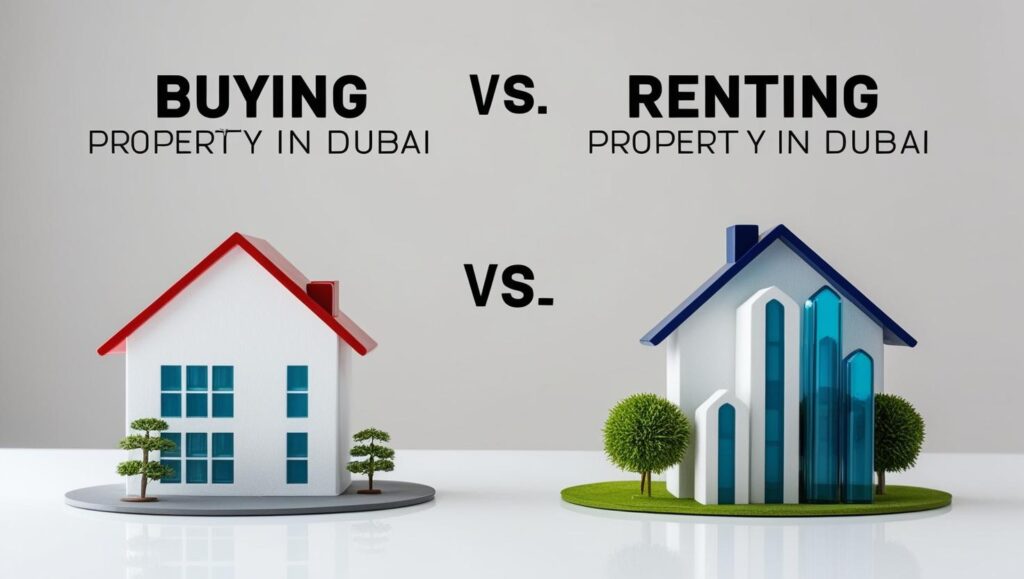Buying Vs Renting in Dubai

Buying Vs Renting In Dubai.
Dubai, known for its towering skyscrapers, luxury lifestyle, and cutting-edge innovation, has become a top destination for both investors and residents alike. If you’re thinking about relocating to this dynamic city or exploring investment opportunities, one of the first major decisions you’ll encounter is whether to buy or rent a property. Each option offers its own benefits and drawbacks, and the best choice depends on your personal lifestyle, financial objectives, and long-term plans. Let’s take a closer look at the pros and cons of buying versus renting property in Dubai.
Renting Property in Dubai
Pros of Renting:
Flexibility: Renting provides a high degree of flexibility, especially beneficial for expats or those uncertain about their long-term plans in Dubai. Lease terms typically range from 1 to 3 years, allowing you to avoid the long-term commitment of property ownership.
Lower Initial Costs: Renting requires significantly less upfront capital than buying. While you’ll need to pay a security deposit and possibly a few months’ rent in advance, it’s far more affordable than making a down payment and covering other purchasing expenses.
Maintenance-Free Living: In most rental agreements, the landlord is responsible for maintenance and repairs. This can be a major advantage if you prefer to avoid the hassles of property upkeep.
No Market Risk: Renting shields you from the volatility of the property market. If property values decline, your finances remain unaffected since you’re not tied to a long-term investment.
Cons of Renting:
No Ownership: The biggest drawback of renting is that you’re not building equity. Your monthly rent payments contribute to the landlord’s investment rather than your own asset.
Potential Rent Increases: Although rent prices are regulated in Dubai, landlords can increase rent after the lease ends, depending on market conditions—potentially leading to higher living costs.
Limited Customization: As a tenant, your ability to modify or personalize the space is restricted. Your home may not feel fully tailored to your tastes.
Buying Property in Dubai
Pros of Buying:
Building Equity: Buying allows you to build equity over time as your mortgage payments go toward ownership. This can pay off in the long run, especially if property values rise.
Stability and Control: Homeownership offers greater stability. You’re free from lease renewals and rent hikes, and you have complete control over the design and function of your living space.
Long-Term Investment: Dubai’s real estate market has shown long-term growth potential. With ongoing development and increasing demand, property ownership may yield strong returns over time.
Golden Visa Eligibility: Certain property investments may qualify you for the UAE’s Golden Visa, granting long-term residency—a major perk for those seeking to stay in the country for the foreseeable future.
Cons of Buying:
High Upfront Costs: Buying property involves significant initial expenses, including a down payment (usually 20–25% of the property value), registration fees, and other costs. This can be a financial hurdle for many.
Market Volatility: Dubai’s property market, while promising, can also be unpredictable. Economic shifts, policy changes, or global events can affect property values.
Ongoing Responsibilities: As a homeowner, you’re responsible for all maintenance and repairs. Additionally, you must budget for property insurance, taxes, and possible homeowner association (HOA) fees.
Long-Term Commitment: Buying is a long-term investment. If you plan to leave Dubai within a few years, selling the property might be challenging and potentially lead to a financial loss due to transaction costs and market timing.
Key Considerations When Deciding Between Buying and Renting
Duration of Stay: If you plan to stay in Dubai short-term (a few years or less), renting may be the more practical option. For long-term residents or those seeking investment opportunities, buying could be more advantageous.
Financial Situation: Purchasing property requires significant capital upfront. If you have the means for a down payment and additional costs, buying may be worthwhile. Otherwise, renting remains the more accessible route.
Market Conditions: Keep an eye on the real estate market. Understanding whether it’s a buyer’s or renter’s market can help inform your decision.
Lifestyle Preferences: Consider your lifestyle. If flexibility and lower responsibility appeal to you, renting is likely a better fit. If you value stability, control, and the potential for long-term financial growth, buying may be the smarter choice.
Conclusion: What’s Best for You?
Both buying and renting property in Dubai offer unique advantages. The ideal choice depends on your personal circumstances, financial goals, and lifestyle preferences. Renting provides flexibility and lower entry costs, making it ideal for newcomers or those on temporary assignments. Buying, however, presents an opportunity to build equity, enjoy long-term stability, and potentially gain a profitable investment—especially if you plan to make Dubai your home for years to come.
